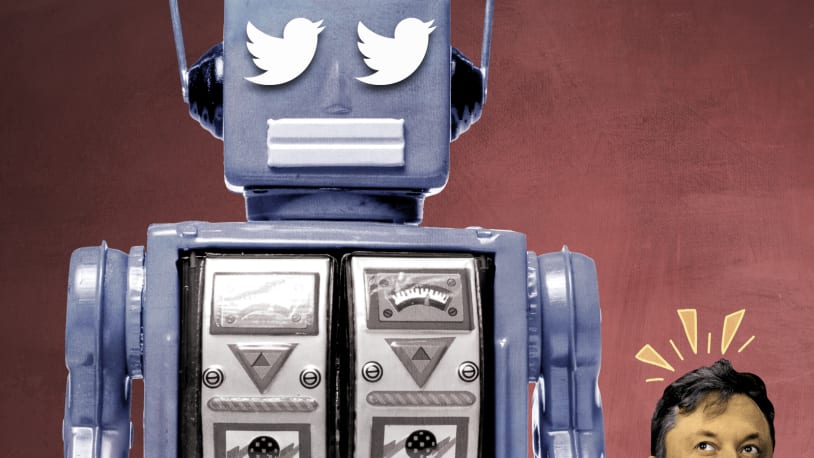
Why is Elon Musk so obsessed with Twitter’s bot accounts?
Practically from the moment Elon Musk made his unsolicited bid to purchase Twitter for $44 billion in April, he’s been complaining about “spam bots,” or automated Twitter accounts not run by humans.
“If our Twitter bid succeeds, we will defeat the spam bots or die trying!” Musk tweeted on April 21. On May 13, he tweeted that the deal was “temporarily on hold” because he needed assurance Twitter wasn’t undercounting the number of bots on its platform. On June 6, his lawyers told Twitter and the Securities and Exchange Commission that unless the company stopped refusing to give him unspecified data to make his own analysis of Twitter’s bot problem, he’ll try to kill the deal.
Twitter responded by agreeing to give Musk access to its data “firehose” of millions of daily tweets, The Washington Post reports, though “Twitter’s leaders are skeptical of Musk’s ability to use the data to find previously undetected information.” What’s really behind Musk’s obsession with Twitter’s bots?
The bots are just an excuse
Clearly, “Elon Musk has buyer’s remorse,” Scott Nover writes at Quartz. Twitter’s stock price has dropped sharply since Musk agreed to pay $54.40 on April 25, and “that’s probably the real reason Musk is spending so much time talking about bots.”
Perhaps Musk wants out of the deal because he has “grown bored of Twitter, or perhaps because the prices of social-media stocks, and of Musk’s company Tesla Inc., had fallen, and $54.20 looked pretty expensive,” Matt Levine writes at Bloomberg Opinion. “The merger agreement does not, however, allow Musk to walk away because he changed his mind,” and blaming allegedly undercounted bot numbers won’t help his case.
For one thing, “Musk has been talking about Twitter’s bot problem forever,” Levine notes, “and in fact he originally said that he wanted to buy Twitter in order to fix the bot problem, so no one could possibly believe him when he said that he wanted to walk away from the deal because he just discovered that Twitter has a bot problem.” Musk “said he wanted to buy Twitter to get rid of the spam bots, and now he’s saying he doesn’t want to buy Twitter because it has spam bots,” tech reporter Casey Newton tells Vanity Fair. “Only one of those things can be true.”
The bots really do affect Twitter’s bottom line
Musk isn’t the only person concerned about bots. “Fake social media accounts have been problematic for years,” The Associated Press reports. “Advertisers rely on the number of users provided by social media platforms to determine where they will spend money,” so a prospective owner of Twitter would want to know the real numbers. Twitter says fewer than 5 percent of its accounts are bots, while Musk speculates the number could be 20 percent or higher.
Bots are “a big deal,” Musk argued on a June 6 podcast. “It seems like if you said, ‘Okay, I agree to buy your house.’ You say the house has less than 5 percent termites. That’s an acceptable number. But if it turns out it is 90 percent termites, that’s not okay. It’s not the same house.”
Texas Attorney General Ken Paxton (R) made a similar case when, also June 6, he announced an investigation into Twitter’s bot count, arguing lowball numbers could violate the Texas Deceptive Trade Practices Act. “Texans rely on Twitter’s public statements that nearly all its users are real people,” he said. “It matters not only for regular Twitter users, but also Texas businesses and advertisers who use Twitter for their livelihoods.”
Bots are a particular nuisance for Musk
Analysts saw Paxton’s lawsuit “as a politically expedient way to align” himself with Musk, who recently moved himself and Tesla to the state and announced he is a Republican, The New York Times reports. And “whatever his intention in raising the issue,” Musk “likely has far greater exposure and experience with fake and spam accounts than most on the social-media platform,” Sarah Needleman writes at The Wall Street Journal.
Researchers say “Musk’s prominence and interaction with other users, as well as the topics he tweets about, make him a magnet for people looking to spread spam and other suspicious content,” Needleman reports. And a recent estimate from SparkToro found that “around 70 percent of Mr. Musk’s followers on Twitter are spam, fake or inactive, versus 41 percent for all other accounts with between 65 million and 120 million followers.”
Musk is “an outlier among outliers,” bot expert Darius Kazemi tells the Journal. “His experience is going to be different from not just the average user, but the average celebrity.”
In the end, though, “who wins here?” Caleb Ecarma asks at Vanity Fair. “Twitter’s board? Musk? The bots? According to close industry observers, what we’re seeing play out is likely less about spam accounts and more about the power dynamics between Twitter — a company that’s struggled to get itself on firm footing — and Musk, the only man who appears interested in buying it.”
Practically from the moment Elon Musk made his unsolicited bid to purchase Twitter for $44 billion in April, he’s been complaining about “spam bots,” or automated Twitter accounts not run by humans. “If our Twitter bid succeeds, we will defeat the spam bots or die trying!” Musk tweeted on April 21. On May 13, he…
Practically from the moment Elon Musk made his unsolicited bid to purchase Twitter for $44 billion in April, he’s been complaining about “spam bots,” or automated Twitter accounts not run by humans. “If our Twitter bid succeeds, we will defeat the spam bots or die trying!” Musk tweeted on April 21. On May 13, he…